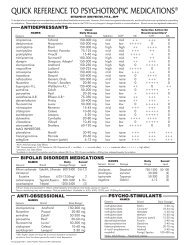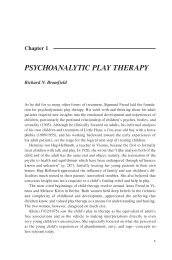IRAQ WAR CLINICIAN GUIDE
Iraq War Clinician's Guide - Network Of Care
Iraq War Clinician's Guide - Network Of Care
Create successful ePaper yourself
Turn your PDF publications into a flip-book with our unique Google optimized e-Paper software.
- p-<br />
Iraq War Clinician Guide 194 Appendix<br />
Medication. In addition to psychotherapy, there are several types of antidepressant medications<br />
used to treat depression. These include selective serotonin reuptake inhibitors (SSRIs), tricyclics,<br />
and monoamine oxidase inhibitors (MAOls). The newer medicationsfor treating depression, such<br />
as the SSRls, generally have fewer side effects than older types of medications. A healthcare<br />
provider may try more than one type of medication, or may increase the dosage, to find a<br />
treatment that works. Improvements in symptoms of depression typically occur after the<br />
medication is taken regularly for 3 to 4 weeks, although in some medications it may take as long<br />
as 8 weeks for the full effect to occur.<br />
Antidepressant medicationsare typically safe and effective. They help patients feel less depressed<br />
and generally do not make people feel "drugged" or different during their daily lives. The side<br />
effects of depression medicationsvary dependingon the medication, and can include dry mouth,<br />
constipation, bladder problems, sexual problems, blurred vision, dizziness, drowsiness, headache,<br />
nausea, nervousness, or insomnia. Because of side effects or because they begin feeling better,<br />
patients are often tempted to stop taking their medication too soon. Some medications must be<br />
stopped slowly to give your body time to readjust to not having the medication. Never stop taking<br />
an antidepressant without consulting your doctor.<br />
What Can I Do about Feelingsof Depression?<br />
Depression can make a person feel exhausted, worthless, helpless, hopeless, and sad. These<br />
feelings can make you feel as though you are never going to feel better, or that you should just<br />
give up. It is important to realize that these negative thoughts and feelings are part of depression,<br />
and often fade as treatment begins working. In the meantime, here is a list of things to try to<br />
improve your mood:<br />
Talk with your doctor or healthcare provider<br />
Talk with family and friends, and let them help you<br />
Participate in activities that make you feel better, or that you used to enjoy before you began<br />
feeling depressed<br />
Set realistic goals for yourself<br />
Engage in mild exercise<br />
Try to be with others and get support from them<br />
Break up goals and tasks into smaller, more reachable ones<br />
Where Can IFind More Information About Depression?<br />
National Institute of Mental Health Depression Fact Sheet:<br />
~~\~~~.~ii~~ili.~iili.e~~/~~~I~Ii~al/~Je~~re~~i~ri.ci~n<br />
National Alliance for the Mentally Ill: www.nami.o~.q<br />
National Center for Post-Traumatic Stress Disorder: www.nc~tsd.org<br />
P -<br />
P<br />
DEPARTMENT OF VETERANS AFFAIRS<br />
NATIONAL CENTER FOR PTSD




